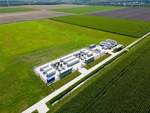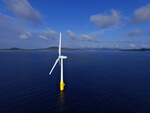News Release from windfair.net
Wind Industry Profile of
Beginning of an Era: alpha ventus Turns 10
The age of offshore wind energy began ten years ago. Germany's first offshore wind farm alpha ventus was inaugurated on 27.04.2010. The pioneering project gave the starting signal for the development of offshore wind energy in the German Bight.
Alpha ventus is the first offshore wind farm in the world to be commissioned under offshore conditions. Over the past decade, alpha ventus has fed a total of 2.1 terawatt hours of climate-friendly electricity into the German transmission grid. The pioneering project was jointly developed by Deutsche Offshore-Testfeld und Infrastruktur GmbH & Co. KG and the OFFSHORE-WINDENERGIE foundation.
Pioneering project in technical, legal and ecological terms
In retrospect, Alpha ventus has proved to be an important spark for the German offshore industry. The approval processes carried out for the first time on the basis of alpha ventus, the testing of technical and logistical construction and operation concepts and the accompanying ecological research provided the offshore industry, which was in the process of being established, with the urgently needed frame of reference. There is therefore a pre-alpha ventus and a post-alpha ventus time calculation for the offshore industry. Before that the small coastal projects. After that the big projects on the high seas. alpha ventus was the first to demonstrate that offshore also works beyond the 12-mile zone.
Over 2 terawatt hours of climate-friendly electricity generated in 10 years
The volume of electricity fed into the grid by alpha ventus in the decade 2010-2019 totals 2.1 terawatt hours. This corresponds to an annual average of around 201 million kilowatt hours each year and thus roughly the annual consumption of 57,000 average households (3,500 kWh) in Germany.
Record months in autumn and winter
At 36,740 MWh, the most productive month was December 2011, which is equivalent to 612 full load hours - or 25.5 days of continuous operation at full load. Yields in January 2012 (30,209 MWh), January and December 2014 (32,819 and 30,759 MWh, respectively) and October 2017 (30,178 MWh) also exceeded the 30,000 MWh mark.
Pacesetter of the offshore industry - and symbol of change
Alpha ventus was not only the pioneering project of the German offshore industry, but also the pacesetter for the following decade. Wind turbines (WTG) with a capacity of 6,440 MW are currently installed in the German Bight. While the WTGs erected in 2019 have an average rated output of 6.9 MW, the average of all installed WTGs at 5.1 MW is close to the 5 MW per WTG already achieved by alpha ventus. Other parameters of the WTGs currently in operation in the North Sea are also on average close to the challenges mastered by alpha ventus for the first time: a water depth of around 30 m, a distance to the coast of 65 km, turbine dimensions of 132 m rotor diameter (alpha ventus: 126 m) and hub heights of 95 m (alpha ventus: 93 m).
Technical and entrepreneurial pioneering spirit
What is average today, required technical and entrepreneurial pioneering spirit in the 2000s. For alpha ventus, for example, the pure construction time at sea for the 12 wind turbines with one transformer station in 2008 and 2009 was around 32 calendar weeks, a deadline which can generally be just as significantly undercut for today's much larger new construction projects with up to 80 wind turbines plus transformer station. The turbines used for alpha ventus have proved their worth in ten years of operation, even though they were erected on the high seas with almost no preliminary testing.
Lessons learned
Nevertheless, extensive repairs were sometimes necessary, including the replacement of components that are subject to particular wear, such as gears or bearings. Such work, which took the installation ships available in 2008 to the limits of what was possible, can now be planned and organised as routine procedures thanks to high-performance offshore logistics. The industry has also learned from the construction of the turbines. For example, so-called monopiles have now prevailed over the foundation types chosen for alpha ventus (tripod and jacket) as standard solutions. The first type of tripod used in six of the twelve alpha ventus WTGs, on the other hand, has proven to be susceptible to scour. This problem was solved for alpha ventus by adding scour protection.
Changed operator constellation
To implement alpha ventus, EWE, E.ON and Vattenfall founded the "Deutsche Offshore-Testfeld und Infrastruktur GmbH & Co. KG" (DOTI). In December 2008 EWE AG increased its stake in the company to 47.5 per cent, while the stakes held by shareholders of E.ON and Vattenfall were reduced accordingly to 26.25 per cent each. RWE AG took over E.ON's shares in 2019.
In terms of installed capacity, DOTI shareholders in their current constellation account for more than one third of the wind turbines installed in the German Bight as of the end of 2019.
- Source:
- alpha ventus
- Author:
- Windfair Editors
- Email:
- press@windfair.net
- Link:
- www.alpha-ventus.de/...
- Keywords:
- alpha ventus, Germany, offshore, wind farm, pioneer, testing, German Bight, North Sea, hub height, turbine, construction, permit, rotor diametre, operation




























